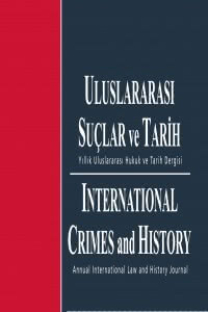SEVR ANTLAŞMASI HAZIRLIK GÖRÜŞMELERİNDE 1915 OLAYLARI KONUSU VE BUGÜNKÜ ULUSLARARASI YARGI KARARLARINA GÖRE DEĞERLENDİRİLMESİ
1920’de, Osmanlı Devleti temsilcisinin davet edilmediği ve MüttefikDevletlerin en üst düzeyde temsil edilmiş oldukları Sevr Antlaşması’nınhazırlık görüşmeleri, 1915 olaylarının soykırım oluşturduğu yolundakiiddiaları doğrulayacak verilerden yoksundur. Öte yandan, günümüzde,BM Soykırım Suçunun Önlenmesi ve Cezalandırılması Sözleşmesi’ndesıralanan soykırımın maddi (actus reus) ve manevi (mens rea)unsurlarını incelemiş ve yorumlamış olan Uluslararası AdaletDivanı’nın (UAD) kararları ve özellikle Bosna Hersek’in SırbistanMontenegro aleyhindeki başvurusuna ilişkin kararında, BMSözleşmesi’nin yorumlanması ve uygulanması çerçevesinde, “devletinsorumluluğu,” manevi unsurun “özel kast” (dolus specialis) olaraksoykırım tanımlanmasındaki belirleyici konumu ile ilgili uygulamışolduğu ilkeler, kıstaslar ve koşullar ışığında da 1915 olaylarını hukukensoykırım olarak tanımlamak mümkün görünmemektedir
Anahtar Kelimeler:
Sevr, Soykırım, Uluslararası Adalet Divanı, DolusSpecialis, Etkin Denetim
THE HANDLING OF THE 1915 EVENTS AT PREPARATORY MEETINGS OF THE TREATY OF SEVRES AND ITS ASSESMENT IN THE LIGHT OF THE CONTEMPORARY COURT RULINGS
The prepatory meetings of the Treaty of Sèvres that took placein 1920, in which the representatives of the Ottoman government werenot invited, whereas the Allied Powers were represented at the highestlevel are devoid of the parameters that would verify the claims that the1915 events constituted a genocide. On the other hand, currently, it doesnot seem legally possible to characterize the 1915 events as a genocidein the light of the International Court of Justice (ICJ) judgments thathave examined and interpreted the actus reus and mens rea componentsof the crime of genocide listed in the UN Convention on the Preventionand Punishment of the Crime of Genocide, especially in the decisionregarding Bosnia Herzegovina’s application against Serbia Montenegro,in the framework of the interpretation and application of the UNConvention and the principles, criteria and conditions applied regardingthe indicative state of the “intent” element in characterizing a genocideas a dolus specialis
Keywords:
Sevres, Genocide, International Court of Justice, DolusSpecialis, Effective Control,
___
- Application of the Convention on the Prevention and Punishment of the Crime of Genocide (Croatia v. Serbia). Judgment. I.C.J. Reports 2015.
- Case Concerning the Application of the Convention on the Prevention and Punishment of tne Crime of Genocide (Bosnia and Herzegovina v. Serbia and Montenegro). Judgment. I.C.J. Reports 2007.
- Case Concerning the Arrest Warrant of 11 April 2000 (Democratic Republic of the Congo v. Belgium). Judgment. I.C.J. Reports 2002.
- Case of Loizidou v. Turkey. Application No. 15318/ 89. Judgment. 18 Aralık 1996.
- Corten, Olivier. “L’arrêt rendu par la CIJ dans l’ Affaire du Crime de Génocide (Bosnie-Herzégovine c. Serbie): Vers un assouplissement des conditions permettant d’engager la responsabilité’d’un Etat pour génocide.” AFDI 53 (2007): 249-279.
- Dupuy, Pierre-Marie. “Crime sans châtiment ou mission accomplie?” European University Institute Working Papers Law 2007/09 (2007).
- Gaeta, Paola. “On What Conditions can a State be Held Responsible for Genocide.” EJIL 18, no. 4 (2007): 631-648.
- Gattini, Andrea. “Breach of the Obligation to Prevent and Reparation Thereof in the ICJ’s Genocide Judgment.” EJIL 18, no. 4 (2007): 695-713.
- Gill, Terry D. “The ‘Genocide’ Case: Reactions on the ICJ’s Decision: Bosnia and Herzegovina v. Serbia.” Hague Justice Journal 2 (2007): 43-47.
- Island of Palmas Case (Netherlands, USA). 4 April 1928. Reports of International Arbitral Awards vol. II.
- Jurisidictional Immunities of the State, Germany v. Italy, (Greece Intervening). Judgment. I.C.J. Reports, 2012.
- Kontrova v. Slovakia. (App. No. 7510/04). Judgment of the ECHR of 31 May 2007.
- Krajewski, Markus ve Christopher Singer. “Should Judges be Front- Runners? The ICJ, State Immunity and Protection of Fundamental Human Rights.” Max Planck Yearbook of United Nations Law, 16 (2012): 1-34.
- Kress, Claus. “The International Court of Justice and the Elements of the Crime of Genocide.” EJIL 18, no. 4 (2007): 619-629.
- Milanovic, Marko. “State Responsibility for Genocide: A Follow-Up.” EJIL 18, no. 4 (2007): 669-694
- Military and Paramilitary Activities in and Against Nicaragua (Nicaragua v. United States of America). Merits. Judgment. I.C.J., Reports, 1986.
- Olcay, Osman. Sevres Andlaşmasına Doğru (Çeşitli Konferans ve Toplantıların Tutanakları ve Bunlara İlişkin Belgeler). Ankara: Ankara Üniversitesi Basımevi, 1981.
- Opuz v. Turkey. (App. No. 33401/02). Judgment of the ECtHR of 9 June 2009.
- Osman v. the United Kingdom. no. 87/1997/781/1083. Judgment of the ECtHR of 28 October 1998.
- Perinçek v. Switzerland. no. 27510. Judgment of the ECtHR of 15 October 2015.
- Prosecutor v. Blagojevic. Case No.IT-02-60-T. Trial Chamber Judgement. 17 Ocak 2005.
- Prosecutor v. Krstic. Case No. IT-98-33-T. Judgement of the Int’l Crim. Trib. Former Yugo. Tr. Chamber. 2 Ağustos 2001.
- Scherr, Daniel. “Jurisdictional Immunities of the State (Germany v.Italy).” New Zealand Yearbook of International Law 10 (2012): 139-152.
- Spinedi, Marina. “State Responsibility v. Individual Responsibility.” EJIL 13, no. 4 (2002): 895-899.
- Tomuschat, Christian. “Reparations in Cases of Genocide.” Journal of International Criminal Justice 5 (2007): 905-912. .
- ISSN: 1306-9136
- Yayın Aralığı: 1
- Başlangıç: 2006
- Yayıncı: Terazi Yayıncılık Basım Dağıtım Danışmanlık Eğitim Organizasyon Matbaacılık Kırtasiye Tic. Ltd. Şti.
